Your arduous Bucks County divorce process is finally over, and you have the papers to prove it. While you may be tempted to rip them to shreds, throw them away, and never think about the process again, you should plan to hold on to them. You’ll probably need them in the future.
How long should you keep divorce papers? Ideally, forever. Learn why you may need your divorce papers down the road and which documents you should keep in a safe space.
Do You Really Need To Keep Divorce Papers Forever?
Maybe your divorce was finalized 20 years ago, and you just stumbled on the paperwork hidden in a drawer somewhere. Is it safe to throw it away? Unfortunately, no.
Any divorce attorney will tell you to keep your complete divorce file forever. Store this paperwork in a safe place, such as a locked, fireproof legal document storage box or a safe deposit box at a bank. You’re also welcome to tuck it away in a basement or the back of a closet and avoid looking at it; just ensure it’s easily accessible should you ever need it.
What Will You Need Your Divorce Paperwork for in the Future?
How long should you keep divorce papers, and which ones take precedence? If your spouse signed any child custody or alimony agreements, you’ll want to keep these on hand as proof of their responsibilities under the arrangement. In the case that your spouse fails to follow one of these orders, you can bring the original agreement to court to prove your spouse’s wrongful behavior.
You may also need your divorce paperwork for future endeavors, such as:
- Changing your name
- Remarrying
- Applying for a mortgage
- Claiming Social Security benefits (if you were married for more than 10 years)
Which Documents Should You Keep From Your Divorce?
You should keep your entire divorce file in a safe place. At the very least, store all of these documents somewhere secure:
- Divorce decree with the raised seal
- Separation agreement
- Marriage license
- Spousal and child support records
- Property appraisal documents
- Financial records
What Happens If You Lose Your Divorce Papers?
If you misplace any of your divorce papers, you can request a new copy from the court where you finalized the divorce. Contact the clerk of courts and provide the date of your divorce, your name, and your ex-spouse’s name.
You may need to pay a fee for the new copies of the paperwork, which can take some time. Hanging on to the original paperwork will ensure you always have access to these documents when you need them.
Contact Karen Ann Ulmer, P.C., for Divorce Assistance
Navigating a divorce doesn’t stop once the divorce is finalized. You’ll likely encounter questions about your divorce for some time after the process is over. If you need assistance with your divorce before, during, or after the process, Karen Ann Ulmer, P.C. is here for you.
Contact us today at (866) 349-4461 for a consultation. We’re committed to calming the chaos and creating solutions for you.





